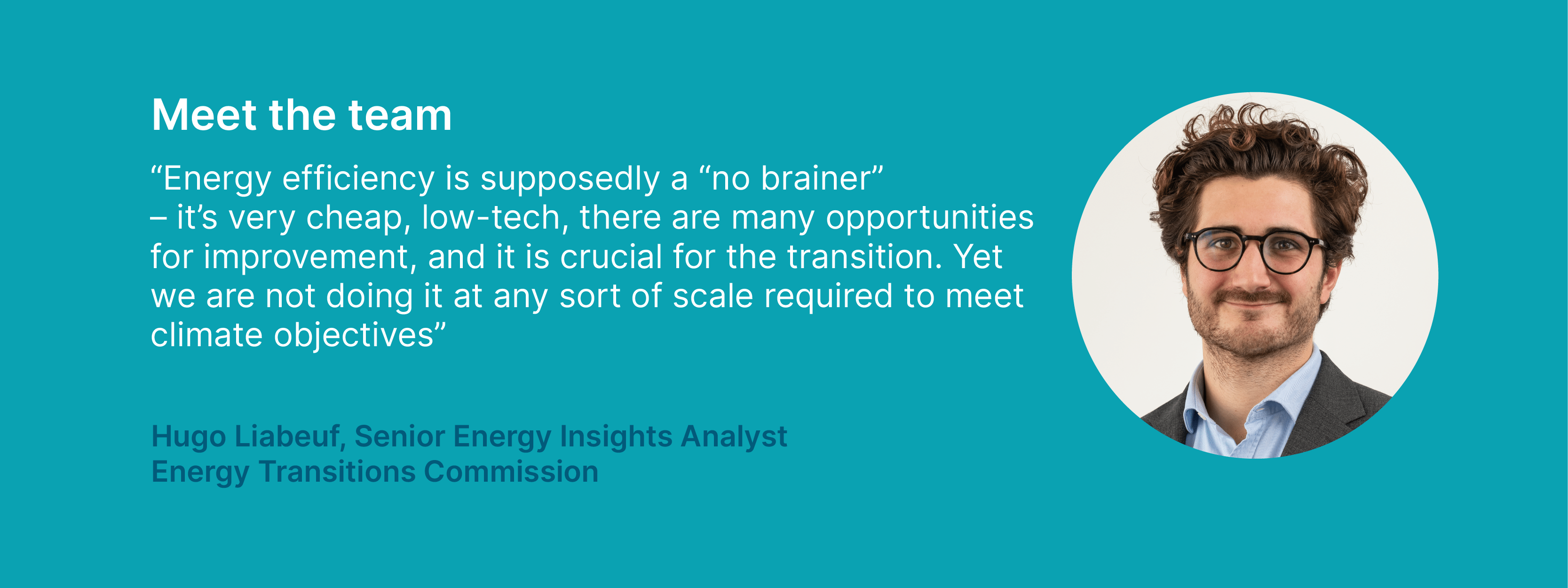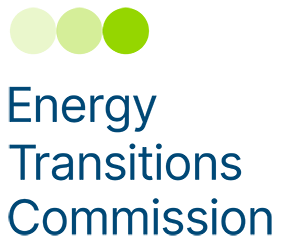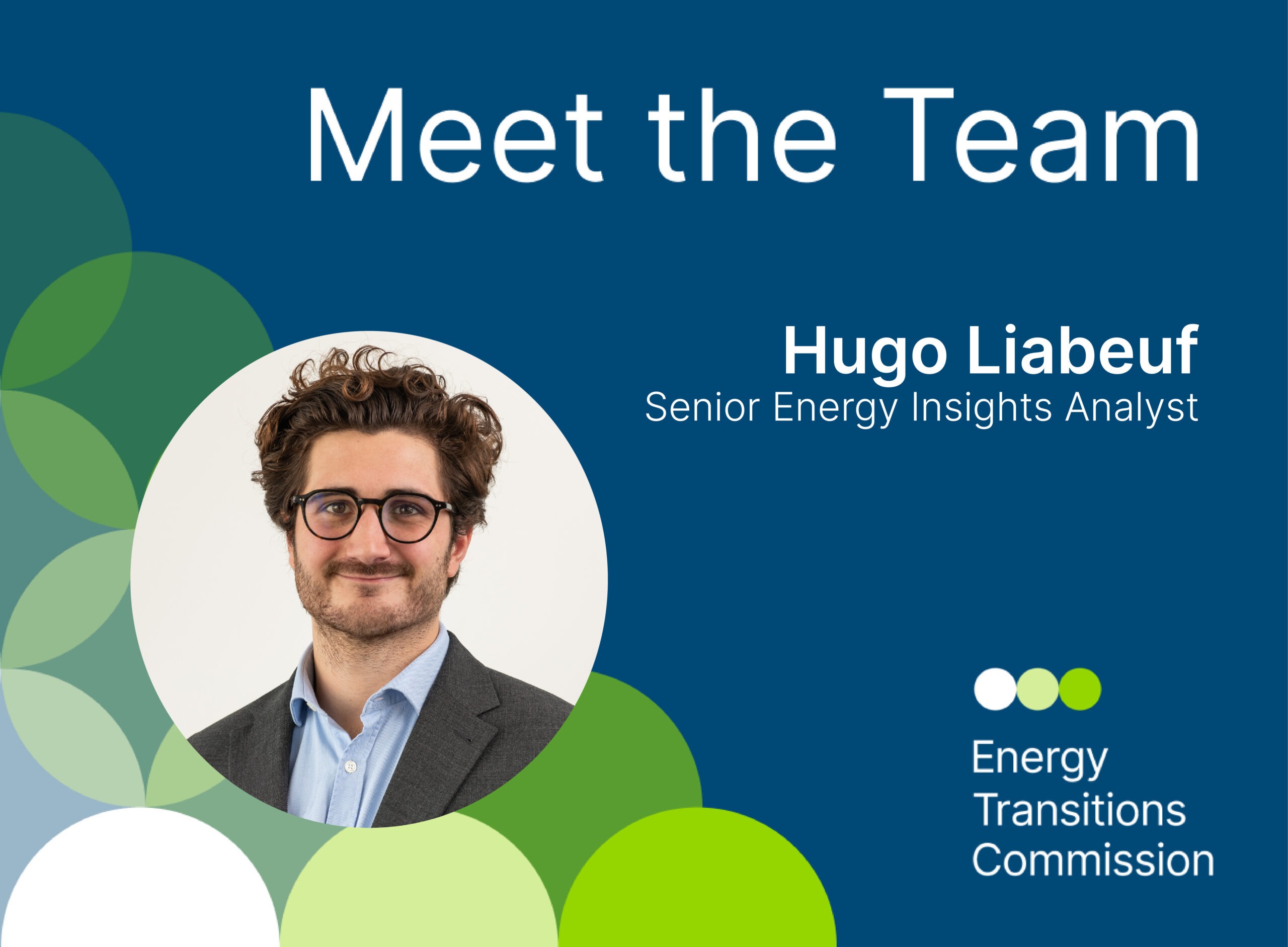Today we introduce Hugo Liabeuf, Senior Energy Insights Analyst at the ETC. Hugo was the lead author of the ETC’s latest report, Fossil Fuels in Transition. Hugo also largely contributed to the Carbon Capture Utilisation and Storage report and Building Energy Security Insights Briefing, published in response to Russia’s invasion of Ukraine and the gas crisis. He is currently leading the ETC’s work on Nationally Determined Contributions.

1. What made you join the ETC?
I came across the ETC in 2020 by reading the Making Mission Possible report – at the time, I was working as a consultant for the energy industry and was struck by the ETC’s clarity on how we achieve a net-zero energy system by 2050. 2020 was a year of growing net-zero commitments, but few had actually nailed down how to achieve these long-term goals. I thought the ETC’s work was truly pioneering, and particularly appreciated their appetite to take a strong stance on the topic. I then kept up to date with subsequent publications and ended up applying when moving to the UK in 2022.
2. What has been your proudest achievement to date at the ETC?
Definitely the Fossil Fuels in Transition report – I’m particularly proud of it for two main reasons:
First, because it has been a sort of “first-of-a-kind” project for the ETC, focusing on the phase-down of the existing energy system rather than the growth of the new, acknowledging not every market will emerge as a winner in the transition. In discussions with our broad membership, an invaluable variety of points of view which really helped us shape the insights of our work – this is truly the ETC’s distinctive feature. I am convinced this report really helped us engage in this complex debate and helped us land some important messages at COP28.
Second, given the tricky nature of the topic and the tight timelines, this report has truly been an ETC-wide effort, involving most, if not all, the Analytical team, but also our entire Regional, Communications and PMO teams. It was truly inspiring to witness such a wide pool of talent and skills we have as a team, without which, it would have not been such a successful report.
3. What does the energy transition mean to you?
The transition is as much of a technical challenge as it is a human one. The energy transition is not only about how we rapidly and deeply decarbonise our energy sector. It’s probably as much about how we ensure the transition enables human and economic development globally. The complexities of a “just transition” are many, and many still think that achieving net-zero implies lower growth and higher inequalities. While I tend to disagree, these are legitimate worries, and we have yet to come up with a blueprint on how to achieve this transition in the most equitable way possible.
4. On the pathway to net-zero, what do you see as the biggest obstacle?
Creating the right business environment for companies to deploy low-carbon technologies is a challenge. Convincing people to build the right things, at the right time, in the right places is also going to be very hard. But the hardest part will probably be the political implications of the transition: not everyone will emerge as a winner. As this becomes increasingly clear, the transition becomes more of a political challenge than a technical or regulatory one.
The political implications of the transition is a challenge we’re not particularly well equipped to deal with, and a great source of uncertainty. We’re going into a big election year, with potential deep implications on the pace of the transition depending on the outcomes. This is for me the greatest source of uncertainty to reach net-zero.I am convinced we’re going to hit net-zero this century, but politics will be the biggest determinant of when we actually get there.
5. What are you most excited about that’s coming up at the ETC?
I would need to say our work on energy productivity. It’s a very broad and complex topic and is often overlooked given it’s neither high-tech nor clearly visible to customers. But it is a huge piece of the puzzle to net-zero. Energy efficiency is supposedly a “no brainer” – it’s very cheap, low-tech, there are many opportunities for improvement, and it is crucial for the transition. Yet we are not doing it at any sort of scale required to meet climate objectives – that’s a bit odd right? Countries have also committed to doubling energy efficiency by 2030 – I am not sure that the implications are understood, or people have plans to achieve that objective.
I think the ETC has a crucial role to play in this paradox, with its strong ability to cut through the complexity of issues and build compelling stories around what can and must happen. Very much looking forward to the outputs of that work!
6. What’s the best piece of advice that you’ve received from an ETC colleague?
“It’s important to understand the details and get the technical stuff right – but never underestimate how far a good story can go. Sometimes, all people need to hear is a good story.”



